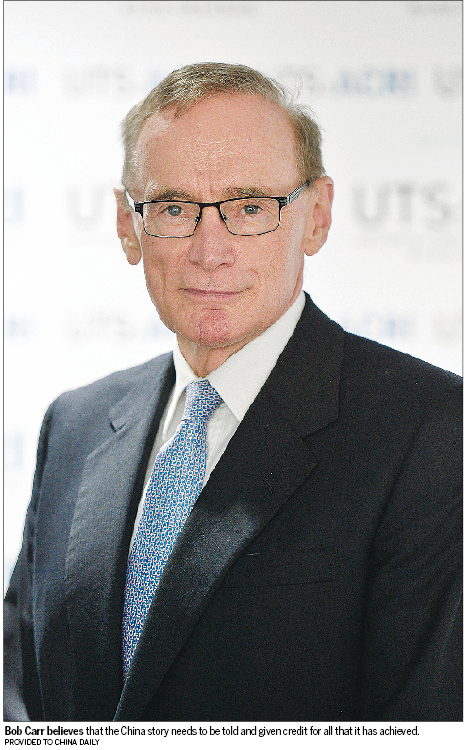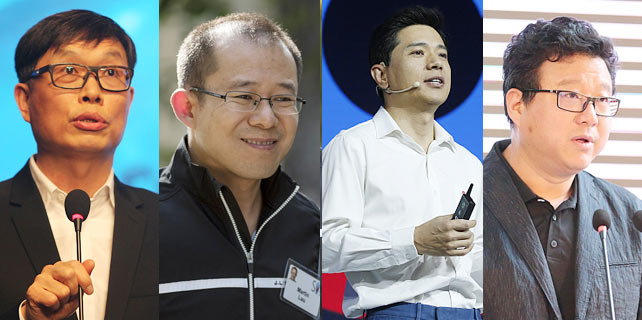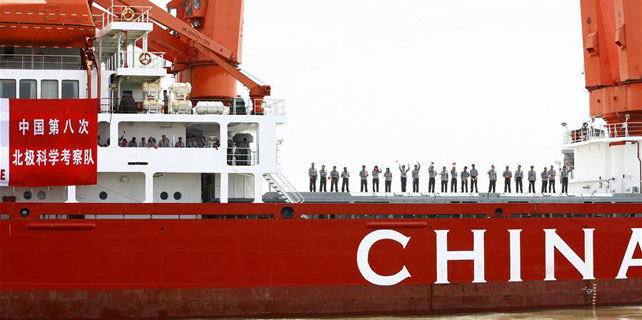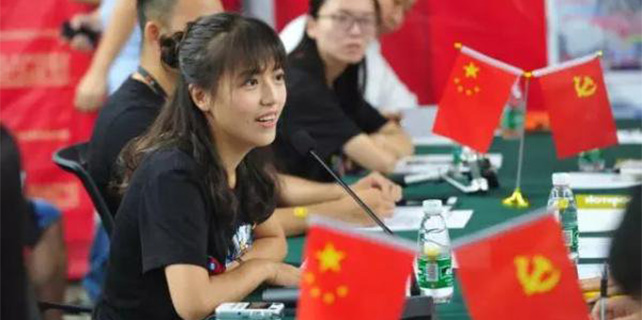Bright thinking

Former Australian foreign minister embraces current role 'illuminating' the positives in ties with China
When Australia's former foreign minister, Bob Carr, was offered the position as director of the Australia-China Relations Institute, he did not have to be asked twice.
The professor of international relations at the University of Technology Sydney said he saw the job as a "challenge".
"Working on Australian-American relations is easy," he told China Daily. "The information is there, we know the Americans and there is not a lot more that can be said except to repeat what others have said about the US-Australia alliance.
"China, however, is different," he said. "It has a different system of government and different values. And that is the challenge.
"Here you have this massive country which in a matter of a few decades has come from nothing to being one of the world's biggest economies and a firm defender of free trade."
Carr served as Australia's minister for foreign affairs from March 2012 to September 2013. ACRI was established at University of Technology Sydney the following year, 2014, with a grant from businessman Huang Xiangmo.
Although Chinese studies centers exist at other universities in Australia, ACRI is the first think tank devoted to the study of the relationship.
"Our role is to illuminate the Australia-China relationship and to focus on the positives," Carr said. "I don't think you can emphasize enough just how important that relationship is … it is huge.
"If you want to know how important China is to Australia, I will answer that question with one statistic — a middle class of 800 million by 2030. That is the guarantor of Australia's prosperity."
China now contributes more to world economic growth than any other country and takes 34 percent of Australian exports. It is Australia's biggest trading partner in terms of imports and exports.
A record 1.2 million Chinese tourists visited Australia in 2016, while the number of Chinese students studying in Australia last year was around 50,000.
At the end of 2015, one of the most comprehensive trade deals ever signed by Australia — the China-Australia Free Trade Agreement — came into being, cementing those ties even further.
Since 1972, when then prime minister Gough Whitlam established diplomatic relations with China, Australia has taken tentative steps to engage the emerging giant to its north.
Engagement with China was a hallmark of Carr's term as foreign minister, including his role in securing agreements for an annual leadership dialogue with Chinese government leaders.
Carr admits the rise of China has "unsettled" some. China is the new economic reality, he said, and cannot be stopped or slowed.
"The China story needs to be told and given credit for all that it has achieved. Yes, China is a big country. It has a culture and civilization that goes back five millennia," he said.
"It has a new self-confidence, having gone from being impoverished to being rich in a short period of time. It has a foreign policy that is being fleshed out.
"What you are looking at is China rising. This is good for China, good for Australia and good for the world."
He said many cultural barriers have started to come down due to the number of Chinese students now studying in Australia and growth in the numbers of Chinese now traveling abroad.
"This is the first time in (Australia's history that) we have had an important economic relationship with a country different in governance, politics and values," he said.
Carr believes the way that Australia's relationship with China will evolve can be summed up in just one word, "diplomacy".
As the longest serving premier in the Australian state of New South Wales (1995-2005), he knows something about diplomacy.
Having joined the Labor Party when he was 15, he knew only too well how the backroom of politics worked and how to play the game.
Carr grew up in the working-class Sydney suburb of Matraville where his father was a train driver. He attended the local high school, where he graduated as a top student, and was the first member of his family to go to university. He studied history, including the history of China from the revolution in 1911 to 1949.
"I have been fascinated by China ever since," he said. "It opened a new door but I never imagined at the time it would figure so prominently in my life or indeed that of Australia."
After university, Carr was still active in politics but worked as a journalist until he managed to secure a seat in the New South Wales legislative assembly in a by-election in October 1983.
Although he harbored ambitions of a career in federal politics, he had to wait until March 2012, when then prime minister Julia Gillard nominated him to fill a casual vacancy in the Australian Senate. At the same time, she appointed him minister for foreign affairs.
Only 28 state premiers have made the jump to federal politics in the 111 years since Australia's 'federation' in 1901 — when six self-governing British colonies united to form the Commonwealth of Australia — and only four state premiers have done it since World War II. Carr was the first premier from New South Wales to join the Senate.
In an address to the Center for Strategic and International Studies Banyan Tree Leadership Forum in Washington, DC — in April 2012, not long after becoming foreign minister — Carr spoke about the rise of China.
"China's rise today is in fact a reemergence, a return to the position of strength that China possessed before its decline during the Qing Dynasty (1644-1911)," he said.
"No one can read about the tumult of China's history, about the history of the Chinese revolution from 1911, without being struck by the huge sacrifices the Chinese people made for their unity and independence.
"During the war with Japan, for example, during the two periods of civil war, the 1920s, the war against the warlords, the fallout between the Kuomintang and the Communists, and the civil war after 1945.
"Huge sacrifices by the Chinese people, but sacrifices that have yielded stunning successes."
"Looking at this history, think of what has happened to China," he said.
Talking about the reform and opening-up policy initiated by late Chinese leader Deng Xiaoping in 1978, Carr said it was a faster industrialization and on a bigger scale than that of America itself in the 19th century. It happened faster, more people are affected, more dramatic effects for the world than even America's rise to industrial dominance.
"Few could be unmoved, looking at this, by the scale of this reemergence of China. Few could be untouched by what it means for the Chinese people — liberated from poverty, historic poverty. Few could be reluctant to see this renewed China take its place in the councils of the world."
Today, looking out over western Sydney from the 18th floor of the UTS Tower building where ACRI is based, Carr is optimistic about the future.
"Putting China to one side," he said, "I think Australia is starting to make its presence felt throughout the region.
"Our diplomacy is very strong in most capitals of the Association of Southeast Asian Nations and that helps bridge the divide. We are no longer just a colonial outpost. We are a multicultural country with strong Asian roots."
















